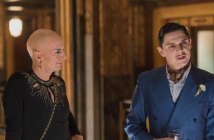Arrested Development, Season One, Episode Seven, “In God We Trust”
Original airdate December 14, 2003
The Bluths of Arrested Development are an all-American family, or at least a family that could only be possible in America. Through a series of shady deals, patriarch George Bluth, Sr. has found himself behind bars, while his wife and four grown children struggle after having lived most of their lives as millionaires. Semi-responsible widower Michael tries to get his father out of jail, keep the business afloat and keep the family together, a generally impossible task considering the slow simmer of hostility everyone in the Bluth family nurtures as though it were their sole prized possession.
Though every episode of Arrested Development is jam-packed with crazy plot lines and one-liners, the first Christmas-themed episode, “In God We Trust,” is remarkable and ambitious, with so much going on that the episode really should come with its own Cliff’s Notes pamphlet. Frequent guest star Henry Winkler once called Arrested Development “hysterical anarchy,” an apt phrase for a show with nine fully fleshed-out characters with their own completely bonkers sets of behaviors, personal goals and quirks. In every episode, these nine Bluths and assorted friends, lovers and colleagues collide with each other like emotional bumper cars.
“In God We Trust” is no different. The main storyline involves the possibility of George, Sr. getting out of jail on a day pass so he can participate in the annual Living Classics Pageant, where he has, for decades, played God in a tableau recreation of Michelangelo’s “The Creation of Adam.” Family lawyer Barry Zuckercorn (played by Winkler) is both odious and incompetent, and Michael doesn’t believe he can help George, Sr. get out for a day, let alone for good.
A variety of subplots surround this event, subplots which would not be out of place in your average afternoon soap opera. This Christmas, everyone seems to have a relationship they want to keep secret: Buster doesn’t want his mother Lucille to know that he’s dating her rival, Lucille II (guest star Liza Minnelli); George-Michael nurtures his crush on his cousin Maeby while also trying to keep it hidden; the same goes for Michael and his secret love for his brother Gob’s girlfriend; and Lucille decides to shake things up by taking a date with her to the pageant, even though she’s still married to George, Sr.
As irreverent as any other sitcom of the mid-2000’s, Arrested Development indulges in plenty of unsubtle (and entirely undeserved) comparisons between the Bluth family patriarch and God, the character he plays in the tableau. It’s a comparison that doesn’t seem to bother anyone in the family proper, though the same can’t be said for the innocent bystanders once again affected by Bluth shenanigans: when George, Sr. runs away, leaving a hole in the tableau where he was supposed to be, one pageant attendee wails, “There is no God!”
If “In God We Trust” is remembered for anything, it’s for the establishment of one very important running gag: Tobias Fünke’s secret struggle as a never-nude. His psychological affliction forces him to wear denim Daisy Dukes at all times, and George-Michael secretly borrows these for the pageant, having learned too late that his costume for Michelangelo’s Adam was nude in the classical artistic tradition; that is, it featured a very small penis. The teen decided that silly cut-offs were less embarrassing than two tiny acorn-shaped bits on his crotch.
“In God We Trust” may have been light on Christmas content, but that surely deliberate, at least if Barry’s comment is any indication: Christmas is “like any other day,” he explains, “except I charge double.” This episode did some heavy lifting in establishing recurring jokes and traits of the core characters, as well as the much more subtle theme of the Bluth family’s lack of interaction both with the world around them and each other. Sure, they know it’s the holidays and they go through the motions, but they’re either uninterested or irritated by it. This is true even for Michael, the one guy who actually gives a damn about the family as a whole. This decidedly un-Christmasy Christmas episode goes a long way in establishing and explaining the Bluth family trait of self-inflicted isolation.




